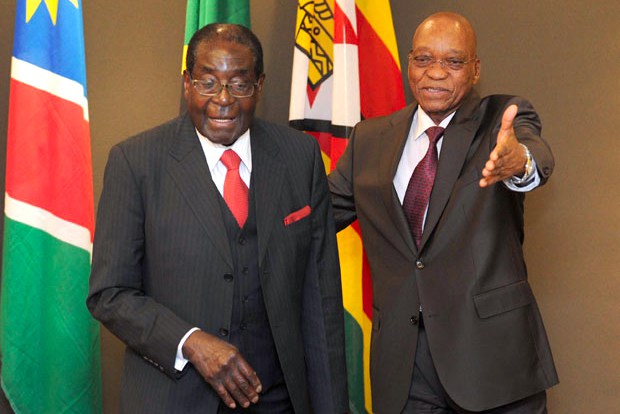The political exorcism of southern Africa: Hope for democratisation of the continent

African leaders who fought for independence soon departed from their initial objectives before African people could see the benefits of independence. Even though leaders who came after independence were also far from what African people needed, there is hope that current changes in southern Africa can inspire the entire continent.
The founding fathers of the Organisation of African Unity, now called African Union had the promotion of democratic principles and institutions, popular participation and good governance of Africa, as a key objective of the organisation. Hardly had they left office when some of them flashed this continental goal down the drain. We then saw the emergence of autocracies and despotic rule on the continent, wherein a certain crop of leaders started viewing themselves as having monopoly of the redemptive vision of the African people.
This departure from the objective was presided over by the likes of General Muammar Gaddafi of Libya, Comrade Robert Mugabe of Zimbabwe, Omar Bongo of Gabon, and Mobutu Sese Seko of the former Zaire (now Democratic Republic of Congo—DRC), among others, who were later emulated by younger presidents. Due to this departure, Africa has suffered not only under the weight of natural calamities like droughts, famine and disease, but also human induced calamities such as civil wars, corruption, and disregard of the rule of law and democratic principles.
Following the rise of social movements and civic activism among the populace in Africa, there is a glimmer of hope for the continent. This “revival” can be traced back to the 1990s, but was recently revamped in 2011 with the “Arab Spring” in which the world witnessed the fall of entrenched dictatorships in North Africa, at the hands of the citizens. This marked just the beginning of the “political exorcism” in Africa, ending Ben Ali’s 23-year rule in Tunisia, Hosni Mubarak’s 30-year rule in Egypt and most significantly, ending the 42-year reign of Muammar Gaddafi over the people of the oil rich Libya. A number of West African presidents like Ellen Johnson Sirleaf in Liberia, and leaders in countries like Ghana, and Senegal, have taken unprecedented progress of leaving office honourably within the constitutional terms.
By the end of 2017, one could authoritatively say the “tide” which seemed to be sweeping from north to south, had changed direction. There is a new wind of democratisation and regime change that is currently sweeping northward in furtherance of the “political exorcism” to return hygiene in African politics. Currently, political “prophets” are talking of political change in countries where the long stay of liberation movements in power has stifled democratisation, good governance and economic development of the African people. All signs show that “Insha’Allah” the time is now.
In Angola, the resignation of long-time strongman Eduardo dos Santos last year paved the way for his successor João Lourenço. Without prejudice to the challenges presented by leaders who are awarded leadership positions on a silver platter, there are signs that President Lourenco will give democracy and good governance a chance, in the “resource cursed” Angola.
Political pundits continue to hallucinate over what exactly happened in Zimbabwe in November 2017. While the questions of whether it was a bloodless coup d’état, or a resignation of the president, or both (an inside job of the Zimbabwe African National Union –Patriotic Front) remain unanswered, what is certain is that, the African Political dinosaur, Comrade Robert Gabriel Mugabe finally threw in the towel on 21st November, 2017 ending his 37-year reign over Zimbabwe. President Emmerson Mnangagwa has already exhibited tenants of good governance and rule of law by promising to hold free and fair general elections to seek the people’s mandate. This signifies a new dawn in Zimbabwean politics notwithstanding the opposition’s criticism of President Mnangagwa as “a mere change of guards”.
President Ian Khama of Botswana has announced that he is stepping down in April 2018, more than a year ahead of general elections in 2019. His Vice-president Mogweetsi Masisi is his likely successor. For a president who is making ten years in office this year to be paving way before the end of his second term is indeed steady progress. In the words of PLO Lumumba—a Kenyan intellectual—, in his speech entitled “Magufulification of the African Continent”[in reference to the anti-corruption campaign of Tanzanian president John Magufuli], we are seeing some hygiene in Africa’s [politics]. In the continents powerhouse, South Africa, deputy president Cyril Ramaphosa’s rise to the helm of the all-powerful African National Congress, amidst President Jacob’s Zuma’s corruption legal battles, has since culminated into Zuma’s resignation from the presidency.
The prayer in Eastern and Central Africa is that this “hygiene” continues northwards, past the already “exorcised” Tanzania through the politically ailing Kenya, Burundi and Rwanda, to the democratically decaying Uganda and crisis-riddled South Sudan. And then finally resurrect the politically and democratically rotten and decomposing DRC and the Central African Republic.
So we pray.
* James Muhindo is National Coordinator at Advocates Coalition for Development and Environment, Uganda.
